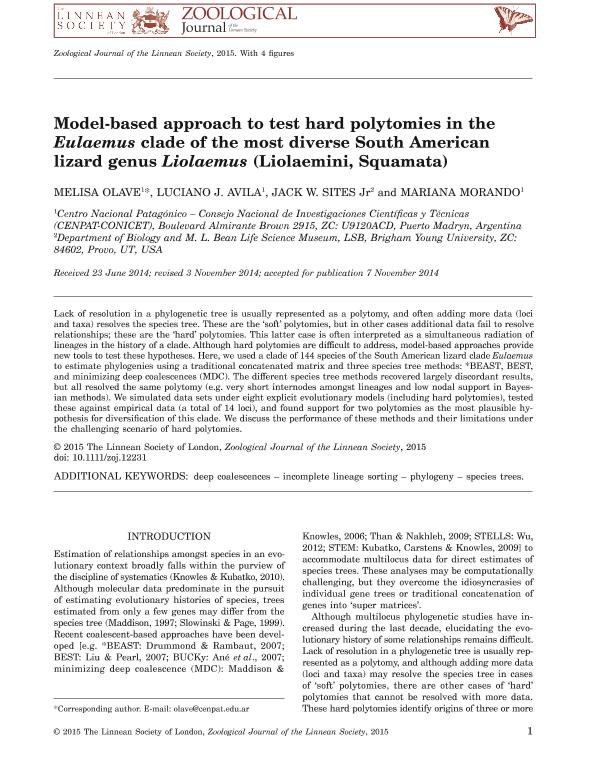Artículo
Model-based approach to test hard polytomies in the Eulaemus clade of the most diverse South American lizard genus Liolaemus (Liolaemini, Squamata)
Fecha de publicación:
02/2015
Editorial:
Wiley
Revista:
Zoological Journal Of The Linnean Society
ISSN:
0024-4082
Idioma:
Inglés
Tipo de recurso:
Artículo publicado
Clasificación temática:
Resumen
Lack of resolution in a phylogenetic tree is usually represented as a polytomy, and often adding more data (loci and taxa) resolves the species tree. These are the ‘soft’ polytomies, but in other cases additional data fail to resolve relationships; these are the ‘hard’ polytomies. This latter case is often interpreted as a simultaneous radiation of lineages in the history of a clade. Although hard polytomies are difficult to address, model-based approaches provide new tools to test these hypotheses. Here, we used a clade of 144 species of the South American lizard clade Eulaemus to estimate phylogenies using a traditional concatenated matrix and three species tree methods: *BEAST, BEST, and minimizing deep coalescences (MDC). The different species tree methods recovered largely discordant results, but all resolved the same polytomy (e.g. very short internodes amongst lineages and low nodal support in Bayesian methods). We simulated data sets under eight explicit evolutionary models (including hard polytomies), tested these against empirical data (a total of 14 loci), and found support for two polytomies as the most plausible hypothesis for diversification of this clade. We discuss the performance of these methods and their limitations under the challenging scenario of hard polytomies.
Palabras clave:
Deep Coalescences
,
Incomplete Lineage Sorting
,
Phylogeny
,
Species Tree
Archivos asociados
Licencia
Identificadores
Colecciones
Articulos(CCT-CENPAT)
Articulos de CTRO.CIENTIFICO TECNOL.CONICET - CENPAT
Articulos de CTRO.CIENTIFICO TECNOL.CONICET - CENPAT
Citación
Olave, Melisa; Avila, Luciano Javier; Sites, Jack W.; Morando, Mariana; Model-based approach to test hard polytomies in the Eulaemus clade of the most diverse South American lizard genus Liolaemus (Liolaemini, Squamata); Wiley; Zoological Journal Of The Linnean Society; 174; 1; 2-2015; 169-184
Compartir
Altmétricas




